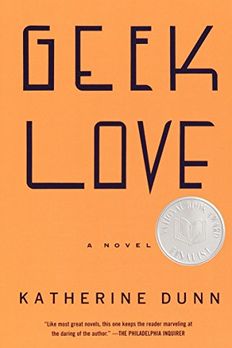

Through carefully researched and dosed insecticides, radioactive chemicals, and sundry recreational drugs, Lil gives birth to her children: Arty, "The Aqua Boy" with flippers instead of arms and legs Iphygenia and Electra, the conjoined twins Chick, who possesses telekinetic powers and Olympia, our narrator, an albino dwarf. It is a battle cry against cultural conformity, a massive and poetic f*ck you to the patriarchal standards. When times got tough on the carnival show, Aloysius (Al) and Lil decided to introduce a host of new acts by breeding their own freakshow. Geek Love is the story of Aloysius and Lily 'Crystal Lil' Binewski, their traveling "Carnival Fabulon," and, most importantly, their children. It is a battle cry against cultural conformity, a massive and poetic f*ck you to the patriarchal standards - and those who fight to uphold them - that would have anyone who is not a white man with a white collar job feel less than worthy, less than valid, less than human.


But Geek Love is a timeless classic that’s relevance has only grown in the three decades since its publication. Dunn didn’t know the book she spent a decade writing would, 30 years later, be a cult classic - and how could she have? No one who sets out to write the Great American Novel actually does it. That is the world in which Katherine Dunn’s 1989 novel Geek Loveunfolds and ultimately unravels. By seeing them, you too can be seen and accepted as human.

And then, of course, there’s the sideshow where people are making a name and a living by embracing - and flaunting - bodily oddities or physical abnormalities. It’s this off-ness, however, that also makes carnivals a home for so many people: No matter who you are or where you come from, you can find comfort and solidarity in the circus performers who eat fire, swallow swords, or bend themselves into unnatural shapes. From Ray Bradbury’s literary classic Something Wicked This Way Comes to the fourth season of American Horror Story, the carnival has always been a place where things are just slightly… off. Even the etymology of the word - a season or festival of merrymaking before Lent an instance of merrymaking, feasting, or masquerading an instance of riotous excess a la a ‘carnival of violence’ - alludes to the potential for something suspect. There is something tangibly unsettling about a carnival: It is a space that inspires mystery and magic that evokes danger and darkness and suspense.


 0 kommentar(er)
0 kommentar(er)
